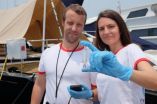(Press-News.org) Arlington, Va. (September 10, 2014) – The Centers for Disease Control and Prevention (CDC) and Premier, Inc. have released new research on the widespread use of unnecessary and duplicative antibiotics in U.S. hospitals, which could have led to an estimated $163 million in excess costs. The inappropriate use of antibiotics can increase risk to patient safety, reduce the efficacy of these drugs and drive up avoidable healthcare costs. The study is published in the October issue of Infection Control and Hospital Epidemiology, the journal of the Society for Healthcare Epidemiology of America (SHEA).
"The overuse of antibiotics is an industry-wide public health issue that is occurring across all care settings," said Leslie Schultz, RN, PhD, the lead author of the study and director of the Premier Safety Institute®, Premier, Inc. "Sometimes in an effort to 'do whatever it takes' to fight a serious infection, clinicians use multiple antibiotics to treat the same infection. This practice can contribute to antimicrobial resistance, put patient safety at risk and increase costs. We hope these findings help to enhance the antimicrobial stewardship initiatives that the majority of U.S. hospitals already have in place today."
Researchers found that 70 percent of potential unnecessary therapies represented three specific drug combinations used to treat anaerobic infections. The drug combination metronidazole and piperacillin-tazobactam accounted for more than 50 percent of the variation. These findings can help hospitals focus and improve their antimicrobial usage efforts by pointing clinicians to areas where potential overuse is highest.
Specifically, researchers conducted a retrospective analysis of inpatient pharmacy data from more than 500 U.S. hospitals from 2008-2011 to identify the potential inappropriate usage of 23 intravenous antimicrobial combinations. The analysis showed that 78 percent of hospitals had evidence of potentially unnecessary combinations of antibiotics being administered for two or more days, with a total of 32,507 cases of redundant antibiotics treatment.
Overall, these cases represented 148,589 days of potentially inappropriate antibiotic therapy, resulting in nearly $13 million in potentially avoidable healthcare costs from antimicrobial drugs, alone. If these cases were representative of all U.S. hospitals over the same time period, an estimated $163 million could have been saved through appropriate prescribing. These costs do not include other operational factors, such as the associated supply and labor costs, or patient safety complications.
"Improving the way antibiotics are prescribed not only helps reduce rates of Clostridium difficile infection and antibiotic resistance, but can also improve individual patient outcomes, all while reducing healthcare costs," said Arjun Srinivasan, MD, associate director for Healthcare Associated Infection Prevention Programs in the Division of Healthcare Quality Promotion at CDC. "Eliminating these unnecessarily duplicative antibiotic therapies is a simple way that all facilities can both protect their patients and save healthcare dollars."
In addition to antimicrobial resistance and excess costs, unnecessary intravenous combinations can increase the risk of adverse drug events. Each drug has a risk of side effects, and combinations increase those risks as well as the risks for drug-drug interactions.
Antimicrobial stewardship is an effective strategy for reducing antimicrobial resistance, patient harm, and unjustified variation in healthcare costs. These interventions help physicians choose the right antibiotic, at the right dose and for the right duration.
A policy statement by SHEA, Infectious Diseases Society of America and the Pediatric Infectious Diseases Society outlines recommendations for the mandatory implementation of antimicrobial stewardship throughout healthcare, suggests process and outcome measures to monitor these interventions, and addresses deficiencies in education and research in this field as well as the lack of accurate data on antimicrobial use in the U.S.
INFORMATION:
Leslie Schultz, Timothy Lowe, Arjun Srinivasan, Dwight Neilson, Gina Pugliese. "Economic Impact of Redundant Antimicrobial Therapy in U.S. Hospitals." Infection Control and Hospital Epidemiology [35:10] (October 2014).
SHEA is a professional society representing more than 2,000 physicians and other healthcare professionals globally with expertise in and passion for healthcare epidemiology and infection prevention. SHEA's mission is to prevent and control healthcare-associated infections and advance the field of healthcare epidemiology. The society promotes science and research, develops expert guidelines and guidance for healthcare workers, provides high-quality education, promotes antimicrobial stewardship, encourages transparency in public reporting related to HAIs, works to ensure a safe healthcare environment, and facilitates the exchange of knowledge. SHEA upholds the value and critical contributions of healthcare epidemiology to improving patient care and healthcare worker safety in all healthcare settings. Visit SHEA online at http://www.shea-online.org, http://www.facebook.com/SHEApreventingHAIs and @SHEA_Epi.
Unnecessary antibiotic use responsible for $163 million in potentially avoidable hospital costs
New research finds need for improvement in antibiotic use to safely treat infections
2014-09-10
ELSE PRESS RELEASES FROM THIS DATE:
Blocking one receptor could halt rheumatoid arthritis
2014-09-10
Researchers at the University of Illinois at Chicago College of Medicine have shown for the first time how the activation of a receptor provokes the inflammation and bone degradation of rheumatoid arthritis -- and that activation of this one receptor, found on cells in the fluid of arthritic joints, is all that is required.
Their findings, published online in the Journal of Immunology, point to a new therapeutic target to interrupt the vicious cycle of inflammation and bone erosion in rheumatoid arthritis.
Rheumatoid arthritis is a progressive autoimmune inflammatory ...
NTU partners international universities to build a network of citizen oceanographers
2014-09-10
Nanyang Technological University (NTU) is working with other international universities to build a global network of 'citizen scientists' on a free-to-access database for oceanographic data.
While much attention is placed on mammals and fish in the sea, it is the tiny, marine microbes that supports the nutrient cycle and forms the foundation of the food web. Known as the marine microbiome, they are the most abundant organisms in the ocean but also the least understood.
To gain a better understanding of such marine life and its environment, NTU scientists at the Singapore ...
Residual hydraulic fracturing water not a risk to groundwater
2014-09-10
Hydraulic fracturing -- fracking or hydrofracturing -- raises many concerns about potential environmental impacts, especially water contamination. Currently, data show that the majority of water injected into wells stays underground, triggering fears that it might find its way into groundwater. New research by a team of scientists should help allay those fears.
In a paper published in the current issue of the Journal of Unconventional Oil and Gas Resources, Terry Engelder, professor of geosciences, Penn State; Lawrence Cathles, professor of earth and atmospheric sciences, ...
Penn research shows how brain can tell magnitude of errors
2014-09-10
University of Pennsylvania researchers have made another advance in understanding how the brain detects errors caused by unexpected sensory events. This type of error detection is what allows the brain to learn from its mistakes, which is critical for improving fine motor control.
Their previous work explained how the brain can distinguish true error signals from noise; their new findings show how it can tell the difference between errors of different magnitudes. Fine-tuning a tennis serve, for example, requires that the brain distinguish whether it needs to make a ...
Ocean warming affecting Florida reefs
2014-09-10
ST. PETERSBURG, Fla.— Late-summer water temperatures near the Florida Keys were warmer by nearly 2 degrees Fahrenheit in the last several decades compared to a century earlier, according to a new study by the U.S. Geological Survey.
Researchers indicate that the warmer water temperatures are stressing corals and increasing the number of bleaching events, where corals become white resulting from a loss of their symbiotic algae. The corals can starve to death if the condition is prolonged.
"Our analysis shows that corals in the study areas are now regularly experiencing ...
Networking can make some feel 'dirty,' says new study
2014-09-10
Toronto – If schmoozing for work leaves you with a certain "ick" factor, that's not just awkwardness you're feeling.
Professional networking can create feelings of moral impurity and physical dirtiness, shows a new study.
That can hold people back from networking more, reducing career opportunities and lowering job performance, says study co-author Tiziana Casciaro, an associate professor of organizational behaviour and human resource management at the University of Toronto's Rotman School of Management. The study was co-written with fellow researchers Prof. Francesca ...
New evidence points to outcomes and cost benefits of telemedicine
2014-09-10
New Rochelle, NY, September 10, 2014—Congestive heart failure, stroke, and chronic obstructive pulmonary disease (COPD) are three of the leading causes of death in the U.S. The use of telemedicine to help manage chronic diseases such as these can yield clear benefits including fewer and shorter hospital stays, fewer emergency room visits, less severe illness, and even fewer deaths, as reported in a study published in Telemedicine and e-Health, a peer-reviewed journal from Mary Ann Liebert, Inc., publishers. The article is available free on the Telemedicine and e-Health ...
Halving the risk of preterm birth for some twin pregnancies
2014-09-10
International research involving the University of Adelaide has found that the risk of preterm birth could be halved for a specific group of "super high-risk" twin pregnancies.
The results could help to save babies' lives throughout the world and prevent serious health complications after birth.
The study, involving researchers from the University of Adelaide's Robinson Research Institute, reviewed all of the previous large studies conducted into the use of progestogen hormones, which have been trialed over the past 10 years to help prevent preterm birth in twins. ...
NASA tracks Norbert moisture to Arizona's drenching thunderstorms
2014-09-10
VIDEO:
This simulated flyby of NASA's TRMM satellite on Sept. 8 saw rain falling at a rate of over 62 mm (2.4 inches) per hour in some downpours over Arizona. Some...
Click here for more information.
Post-tropical storm Norbert may have been centered a couple of hundred miles off the northwestern coast of Mexico's Baja California, but the flow of warm, moist air that spun around it generated drenching thunderstorms over Arizona. NASA's TRMM satellite saw Norbert's remnants and ...
Where to grab space debris
2014-09-10
Objects in space tend to spin — and spin in a way that's totally different from the way they spin on earth. Understanding how objects are spinning, where their centers of mass are, and how their mass is distributed is crucial to any number of actual or potential space missions, from cleaning up debris in the geosynchronous orbit favored by communications satellites to landing a demolition crew on a comet.
In a forthcoming issue of the Journal of Field Robotics, MIT researchers will describe a new algorithm for gauging the rotation of objects in zero gravity using only ...
LAST 30 PRESS RELEASES:
Fossil amber reveals the secret lives of Cretaceous ants
Predicting extreme rainfall through novel spatial modeling
The Lancet: First-ever in-utero stem cell therapy for fetal spina bifida repair is safe, study finds
Nanoplastics can interact with Salmonella to affect food safety, study shows
Eric Moore, M.D., elected to Mayo Clinic Board of Trustees
NYU named “research powerhouse” in new analysis
New polymer materials may offer breakthrough solution for hard-to-remove PFAS in water
Biochar can either curb or boost greenhouse gas emissions depending on soil conditions, new study finds
Nanobiochar emerges as a next generation solution for cleaner water, healthier soils, and resilient ecosystems
Study finds more parents saying ‘No’ to vitamin K, putting babies’ brains at risk
Scientists develop new gut health measure that tracks disease
Rice gene discovery could cut fertiliser use while protecting yields
Jumping ‘DNA parasites’ linked to early stages of tumour formation
Ultra-sensitive CAR T cells provide potential strategy to treat solid tumors
Early Neanderthal-Human interbreeding was strongly sex biased
North American bird declines are widespread and accelerating in agricultural hotspots
Researchers recommend strategies for improved genetic privacy legislation
How birds achieve sweet success
More sensitive cell therapy may be a HIT against solid cancers
Scientists map how aging reshapes cells across the entire mammalian body
Hotspots of accelerated bird decline linked to agricultural activity
How ancient attraction shaped the human genome
NJIT faculty named Senior Members of the National Academy of Inventors
App aids substance use recovery in vulnerable populations
College students nationwide received lifesaving education on sudden cardiac death
Oak Ridge National Laboratory launches the Next-Generation Data Centers Institute
Improved short-term sea level change predictions with better AI training
UAlbany researchers develop new laser technique to test mRNA-based therapeutics
New water-treatment system removes nitrogen, phosphorus from farm tile drainage
Major Canadian study finds strong link between cannabis, anxiety and depression
[Press-News.org] Unnecessary antibiotic use responsible for $163 million in potentially avoidable hospital costsNew research finds need for improvement in antibiotic use to safely treat infections







